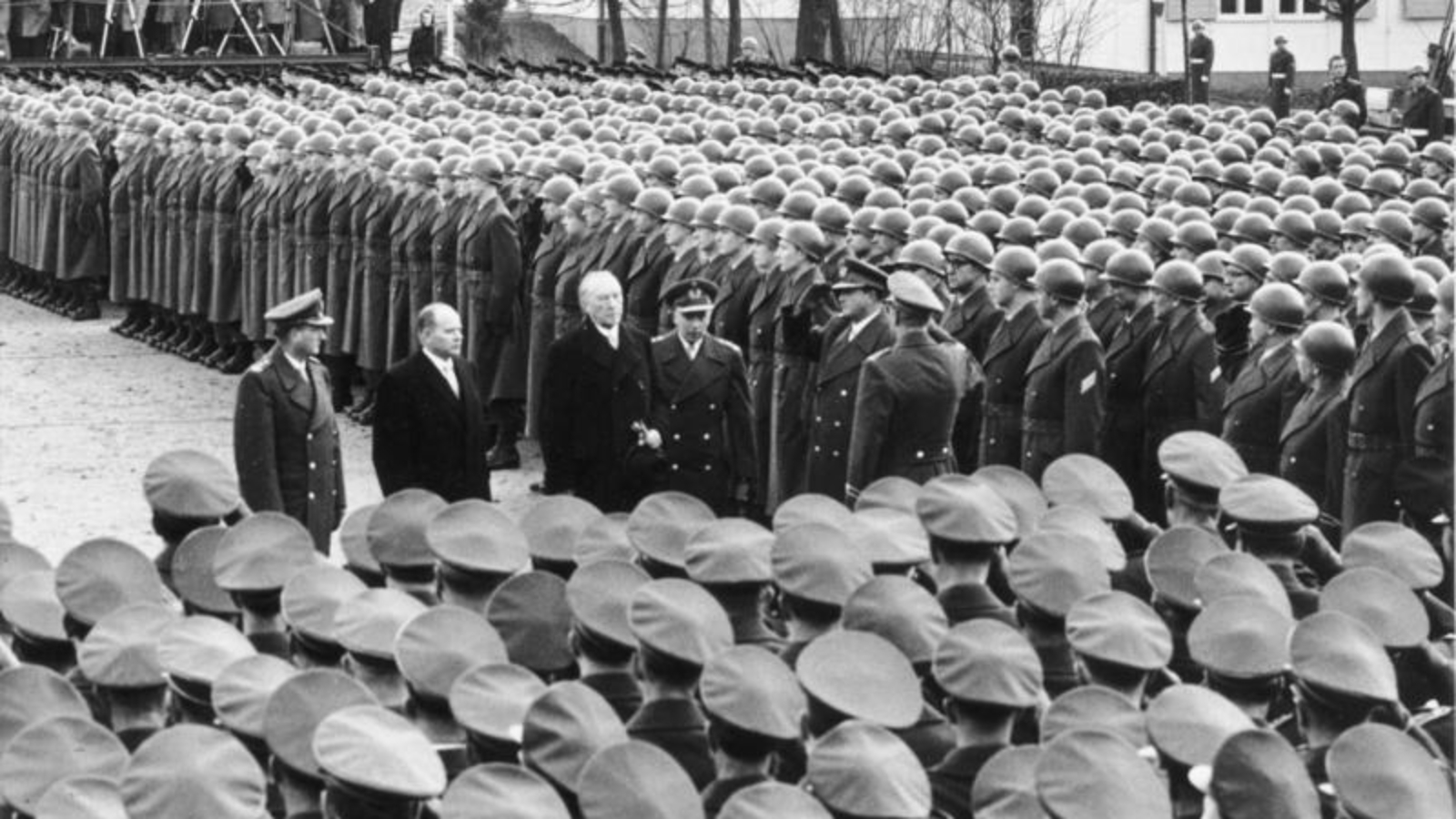[Above: West German Chancellor Konrad Adenauer reviewing troops from the newly-established Bundeswehr in 1955. Image courtesy of Bundesarchiv.]
By Elizabeth Pond
BERLIN – After half a century of honorable service, German conscription is bowing out.
It played an indispensable role in democratizing Germany. It helped make penitence for the Holocaust a social norm in the post-Nazi era. It inculcated the priority of individual conscience over nationalist or military group-think. It re-socialized two generations of Germans, encouraging more open and tolerant attitudes.
And, as a by-product, the draft's recognition of the many conscientious objectors in the wake of Hitler's crimes generated a steady corps of volunteers for alternative civilian service in hospitals, charities, and service organizations.
That era is now history. The last call-up of recruits will take place next week. As part of a major overhaul of the German military, Chancellor Angela Merkel's government is "suspending" conscription—effectively ending it, but without amending the constitution.
In Germany's case, the contribution of universal military service for men went well beyond the usual mixing of social classes that would not otherwise mingle. From 1955 to 1989, the mandatory civic education that accompanied military service helped instill democratic and liberal values in West Germans who had grown up under Hitler's dictatorship. And after German unification in 1990, it helped steer East Germans who had grown up under Communist rule away from xenophobia and the allure of neo-Nazi skinhead gangs.
The path was never easy. After World War Two, newly-minted German pacifists vehemently opposed the reconstitution of any German army. On the left, prominent West Germans argued that their countrymen could never again be trusted with weapons and must remain forever demilitarized. On the right, once the army was reconstituted to bolster the West against the cold-war Soviet threat, some of the retired Wehrmacht officers who were brought back to train fledgling Bundeswehr troops sought to reproduce the imperious pre-war hierarchy.
Anxieties about resurgent German militarism were moot during the post-war Allied occupation of Germany. But in 1955, after ten years in which there was literally no such thing as a West German soldier, the Federal Republic reconstituted its armed forces. To avoid repeating the Weimar Republic's mistake of isolating the elite military "state within the state" from society as a whole, legislators stipulated that the Bundeswehr would be a conscript force.
The constructive nature of the German draft relied on a few visionaries like Count Wolf Baudissin, an army captain who had served under General Rommel until his capture by Allied forces. Baudissin spent six years as prisoner of war in Australia. After returning to Germany, he advocated for re-armament and developed the concept of “inner leadership.” He saw conscription as an unparalleled opportunity to change the German mindset in the next generation. Instead of blindly obeying orders, Bundeswehr soldiers would be schooled to test commands against the demands of the Federal Republic's constitution, human rights, and international law. They would be guided by their consciences and act as citizens first and soldiers second.
By the late 1960s, this notion of the “citizen in uniform” prevailed. The successor generation of young officers took the precept as a given. There was no longer an acute need to transform the old German "bicycle posture"— bowing to superiors from the waist up while kicking subordinates.
As East-West detente set in during the 1970s, anti-militarist Greens and backbencher Social Democrats campaigned to end the draft. Centrist Social Democrats and conservatives—especially in the Bavarian Christian Social Union—refused, and won their case decisively with the return to power of a center-right coalition in 1982.
Thus, when the Berlin Wall suddenly fell and the two Germanys unified in 1990, the universal draft and comprehensive civic education in the army were still in place, ready to apply their evolutionary nudge to a new generation of East German youths.
Yet that East German generation is now pushing 40, and will not be followed by any younger cohort with a conspicuous democratic deficit. The German army shrank as cold-war threats ended and Moscow pulled its troops back a thousand miles east of Berlin. Conscription for this reduced Bundeswehr became inequitable. Current Defense Ministry statistics show that only one seventh of all 18-year-olds are actually called up; this skews the intake of recruits toward the poorer and less well-educated, who cannot easily avoid the draft. Moreover, German generals have concluded that even for those few Germans who are drafted, their six-month term of service is too short for proper training or deployment.
Even so, the draft would no doubt have continued on in a kind of half-life, were it not for the global financial crisis and the Christian Social Union's rising star, Defense Minister Karl-Theodor von Guttenberg. In one of history's ironies, it is a politician from the pro-draft CSU who has given the coup de grace to conscription, in order to shrink the Bundeswehr further and meet his ministry's obligatory cuts in the 2011 budget. His fellow CSU champions of the draft have fallen conveniently silent on the subject. The Greens and backbencher Social Democrats can only approve the demise of conscription and lament that they are not the ones getting credit for its extinction.
The draft had to end in Germany at some point, of course. Britain dropped it in 1960, the United States in post-Vietnam 1973. Even France, which invented the levée-en-masse in the Napoleonic era, abandoned it 12 years after the cold war ended, in 2001. Now the financial squeeze is forcing Berlin to join the NATO trend toward smaller, volunteer armies.
Yet anyone who has witnessed Germany's extraordinary conversion to robust democracy over the decades cannot help but feel a twinge of nostalgia for one of the quiet motors of that transformation.
German conscription, R.I.P.
Elizabeth Pond is an American journalist and author who has lived in Germany for 30 years. She recently wrote an article for World Policy Journal about the “insta-city” of Kangbashi, in Inner Mongolia.
